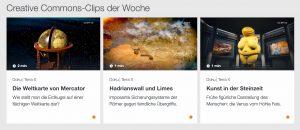Help us protect the commons. Make a tax deductible gift to fund our work. Donate today!
In theory, publishing publicly funded television content under open licenses should be a no-brainer. As with publicly funded research, open licenses improve distribution, allow for remix creativity, and unlock access to popular free knowledge platforms such as Wikipedia.
In practice, however, advocates of open licenses in the realm of public-service media face several hurdles, such as:
- Standard licensing procedures in the world of public-service media do not include open licensing options and are typically limited in time and in scope.
Therefore, releasing material under an open license requires renewed rights clearing efforts with all right holders involved to reflect the conditions set out in open licenses—given the often high number of creators and right holders involved in video content production, this is a difficult, time-consuming, and costly task.
- Standard remuneration rules can make open licensing unattractive for creators.
One common provision, for example, requires public service broadcasters to pay repeated fees any time material is broadcast. With an open license, there are usually no required payments. As a result, remuneration schemes have to be changed to avoid or mitigate the loss of income for creators.
- European Union competition law prohibits state subsidies that may distort competition.
Usually, free and open licenses don’t pose a problem in terms of competition law as long as no special advantage for an individual market actor is associated with using an open license. Generally, public broadcasters act with great caution when it comes to competition rules and many have concerns regarding licensing arrangements that could potentially set off competition issues.
- There are fears of information manipulation.
In light of recent debates on disinformation and “fake news”, public-service media fear that the content they release might be deceivingly and fraudulently manipulated so as to misrepresent facts. While Creative Commons licenses generally permit the creation of derivative works or adaptations (unless the licensor chooses to release content under a NoDerivatives license) and attribution is a requirement for all CC licenses as is a link back to the original so users can see any changes made, they do not govern defamation, disinformation or fabrication of information, which are violations dealt with outside the scope of copyright. Still, there is a reticence in public media television to openly publish content due to such threats despite the aforementioned safeguards within the CC licenses.
German public broadcaster ZDF chooses open licensing
Given these hurdles, the recent initiative by the German national public-service television broadcaster ZDF (“Zweites Deutsches Fernsehen”, literally translated as “Second German Television”) and its documentary series Terra X is remarkable. After a test run with five CC-licensed videos on issues related to climate change in the fall of 2019, the ZDF just launched a platform with 50 explainer videos and promised to add three additional videos each week. All videos are licensed under either CC BY or CC BY-SA, making them compatible with the free online encyclopedia Wikipedia (see the ZDF press release, in German).

A screenshot of the “Terra X” webpage featuring a catalog of CC-BY and CC-BY-SA explainer videos. Access the videos here.
The videos on climate change published in 2019 soon found their way into prominent Wikipedia articles, such as this one on climate change, leading to hundreds of thousands of views. This illustrates how important the posting of content on Wikipedia, which requires the use of a CC BY or CC BY-SA license, is for public service-media, as it can considerably increase the size of the audience and the media’s reach. Earlier experiments by public broadcasters with open licenses had used restrictive license modules such as the Non-Commercial (NC) or NoDerivatives (ND) CC licenses, which reached a very limited audience.
With Terra X leading the way, it will be interesting to see how the “first” German public-service television broadcaster ARD will respond. Hopefully, we will see productive competition between these two public-service broadcasters that will ultimately increase the amount of content available under open licenses produced by public-service media for the benefit of users in Germany and across the world.
This blog post was written by Leonhard Dobusch, a Professor of Organization at the University of Innsbruck in Austria and a member of the supervisory council of the ZDF “Fernsehrat”, representing the societal interests of the internet. He blogs about his work at netzpolitik.org (in German only).
Posted 16 June 2020